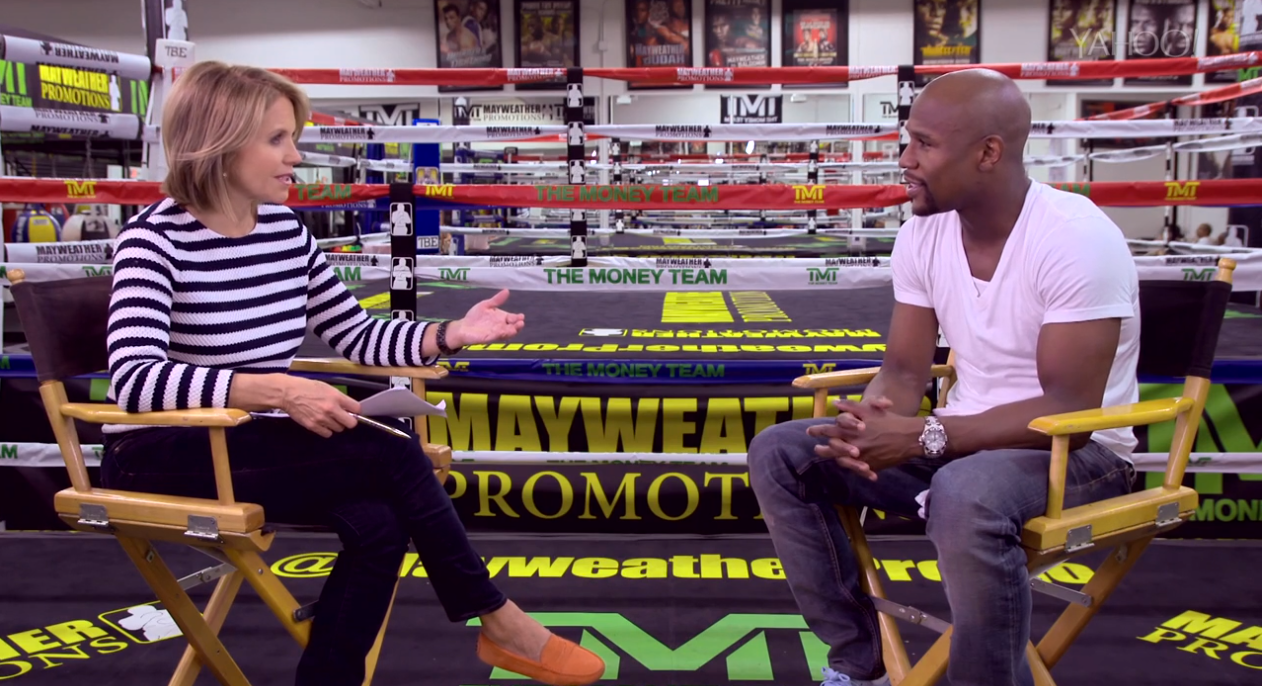Daniel Roberts of Deadspin unleashed the fury on Katie Couric for her softball interview with Floyd Mayweather, in which she allowed the boxer to downplay his history of domestic violence and even blame his victim—saying he was merely trying to “restrain a woman that was on drugs” without explaining how you can bruise someone repeatedly on the head by restraining her. Couric did not challenge Mayweather’s claims of being a victim of persecution, failing to point out that he’s pleaded guilty multiple times to domestic violence charges. When Couric briefly mentions Mayweather’s public defense of Ray Rice for knocking out his fiancée, she hastens to add that Mayweather apologized. Otherwise, Couric was all smiles, nods, and compliments—she even gave him a hug.
This isn’t the first time Couric has provided a space for an abuser to paint himself as a good man who had a minor, nearly inconsequential lapse in judgment. Late last year, she interviewed actor Stephen Collins about sexual misconduct involving three young girls. Couric allowed Collins to go on at length about why he shouldn’t be judged by his actions, because his heart is in the right place. “A pedophile is someone who is mainly or wholly attracted to children. I’m not. I had a distortion in my thinking where I acted out in those ways. But I’m absolutely not attracted, physically or sexually attracted to children. I’m just not,” Collins explained. Couric questioned Collins a little harder than she does Mayweather, but by and large, Collins successfully used the forum she gave him to rehabilitate his bruised image.
Couric’s circumspect approach to these public abusers might be a matter of access: “Maybe that’s what it takes to land an interview with Mayweather these days,” Roberts suggests. Certainly, Ray Rice’s recent streak of softball coverage implies that using access as bait for sympathetic pieces is standard operating procedure for abusive men trying to rehabilitate their public reputation.
Softball interviews are attractive to people who are trying to recover from scandal, and even big-league journalists often take the bait in order to catch the ratings. But it’s a particularly nasty practice when the “scandal” in question is one of sexual assault or domestic violence. These stories perpetuate the notion that it’s common for abuse to be an isolated incident, when, in reality, most men who assault women do it repeatedly. Many victims stay in dangerous relationships because they believe their abuser when he says he didn’t mean it and will mend his ways. If the media is full of glowing stories about a guy who slipped up once but will never (we swear!) do it again, victims might get false hope that their abuser could also be redeemed, if they just hang in there long enough.
